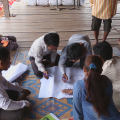5 tips for success in delivering research projects during COVID
Projects for research and policy impact are being challenged by COVID. With lasting impacts on government priorities, travel, access, safety and delivery – what can researchers do to ensure successful delivery of their projects?
We asked this question to the SUMERNET program. SUMERNET is a regional network made up of partners from the Mekong that are committed to the sustainable development, poverty alleviation, gender and social equality and the incorporation of a rights-based approach in natural resource management. Currently Sida supports the SUMERNET for All program which is delivering 18 projects across South East Asia generating knowledge for policy and practice on water insecurity.
How does COVID challenge project delivery?
The challenge of COVID is being felt wide range of issues across project delivery (see word cloud below). 70% of our respondents felt that COVID had ‘A lot’ of impact on their project (as opposed to none or minimal). Most of the impact was coming from the government policies (ie. travel bans, lockdown, etc) and social concern measures (e.g. self-imposed isolation, work-study from home) rather than the direct health effects of the disease. Key changes to projects are timing, methods, and policy impact approaches (see attached graphs). While the key issues around project management were timing and planning for risk and uncertainty.

To address these COVID challenges, we have identified the following 5 tips for success in project delivery.
- Make technology simple and workable.
Most physical engagements have been substituted into a virtual experience. But, make sure the technology works, and everyone is familiar with it. This takes a bit of set up, but across Asia there are variances in bandwidth, stability, access to platforms (e.g. zoom versus teams versus skype, etc). Universally, the one that people were the most familiar with was deemed the most successful. So, if needed, projects should do a practice technology session and then stick to the same platform and tools. Remember that patience is sometimes the greatest tool for success.
- Set the rules of engagement clearly
Set the online expectations clearly so people know when to do what, and how. As no one can read body language, visual hints of engagement, it just takes ‘more effort’ to do online meetings, which is one reason people are tired of the on-line engagement approach. Target engagement clearly with variety of skills, e.g. time for two-way interactions, keep motivated, invest in team building and use variety of online tools like polls, surveys, asking participants to speak, group discussions, etc.
- Rethinking the project team for local connection
For SUMERNET, most of the project teams were designed in a time where travel was easy, case studies were accessible and local knowledge could be ‘acquired’ with time in context. But, the new era means that projects have had to rethink sometimes the place of on-ground work (i.e. community or study area) or the team for delivery, some have even changed the type of policy arena or people to influence. A big finding was that many teams are rearranging on-ground work to use locals, sometimes this meant university students that were local to the case study site. Other times this meant contacting local organisations e.g. women’s groups, to get them to do some of the on ground work (e.g. data collection) instead of just being part of the participants.
- Building a lasting relationship.
Understanding that face to face meetings are also relationship building events. Therefore, ensure that this relationship and trust building happens in the online world. Look to social media and the use of other apps e.g. Facebook, Line, WeChatt, to support the ongoing dialogue that projects have across their participants, boundary partners, policy makers, local communities, etc. This could be sharing photos, insights and knowledge between meetings to ensure your relationship builds a ‘comfort’ setting in which key project players can relate and trust each other. In addition, this lack of buy-in from virtual meetings means it takes longer to get to the same decision points. Some estimate that between 3 to 5 hours extra are required for a one-hour face to face meeting, because there is no ‘comfort’, trust or reciprocity gained through the online event. Plan accordingly.
- Going virtual means opening up options
Finally, there are a range of online tools that can help you engage with people more directly. Therefore, instead of using the same traditional documents and processes and then waiting for responses, etc, think about some new, easy to use technologies that can deliver immediate feedback and connection. This is a good way to keep projects going in the virtual space. Some suggestions for our projects which are free and easy to use include the following:
- Create documents you can edit together, e.g. google docs, sheets
- Use interview collection tools that can immediately store, code and share data to keep the whole team engaged, e.g. Open Data Kit
- Survey’s and other online tools that can be used in events e.g. survey monkey or vevox or flow charting and mind mapping tools e.g. mind meister etc.
Overall, we found that our projects were exposed to a variety of COVID challenges, and changes were needed. Above we have outlined five of the biggest changes surrounding the idea of projects being more virtual, than physical. In addition, for most projects there were also project management concerns around time and budget planning in uncertain times, with the concern for extensions, and flexibility from funders. While the 5 tips are targeted to projects to enhance their delivery, it is clear that program managers have a role in providing clear guidance on flexibility in time and budgets, expectations about adjustments and what delivery in these uncertain times looks like. A clear ‘safety toolbox’ which covers direct health, ethics and program management could support project delivery.
Ensuring we all deliver research to the highest standards is a partnership between project teams, programs, communities and key participants. We look forward to hearing more about what works in these new COVID times, please share your experiences and responses.
Info
This story is part of the following project
SUMERNET 4 All: Engaging with water insecurity in the Mekong Region
Country
Related people
You might be interested in
-
SUMERNET Vision Guide introducing the new phase "SUMERNET 4 All"
The new, revised "Vision Guide" for SUMERNET is now available. This vision guide presents an overview of SUMERNET - its origins and governance structure, background to the network, aims, key research areas, engagement with policy, and outreach products
![SUMERNET Vision Guide introducing the new phase "SUMERNET 4 All"]()
-
SUMERNET 4 All Call for Proposals on Joint Action
SUMERNET 4 All (S4A) provides financial support and technical assistance to consortia of researchers and boundary partners from the Mekong Region
![SUMERNET 4 All Call for Proposals on Joint Action]()
-
SUMERNET launches redesigned website to provide a fresh visual look and direction
SUMERNET is proud to announce the launch of our redesigned website to coincide with our new phase of work on addressing water insecurity in the Mekong Region.
![SUMERNET launches redesigned website to provide a fresh visual look and direction]()
 By
By 







 Read more about SUMERNET
Read more about SUMERNET
